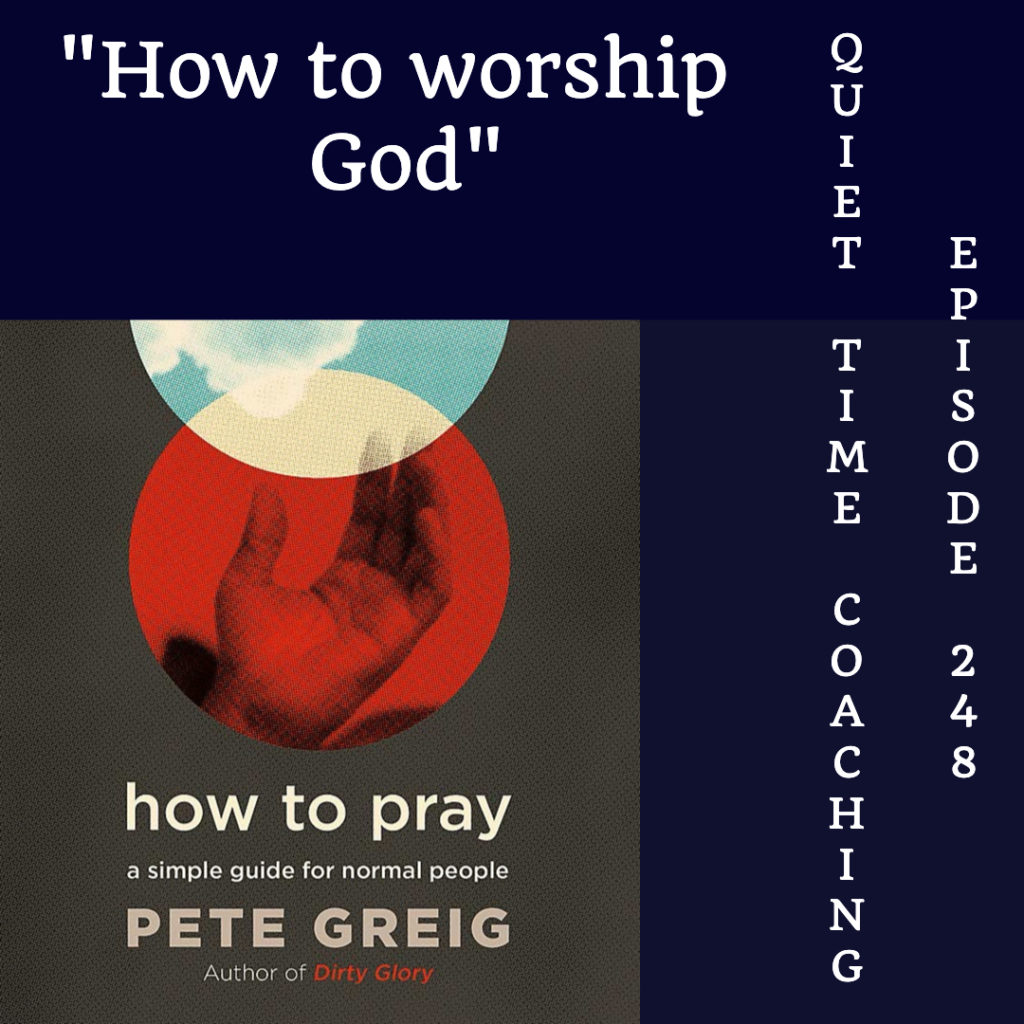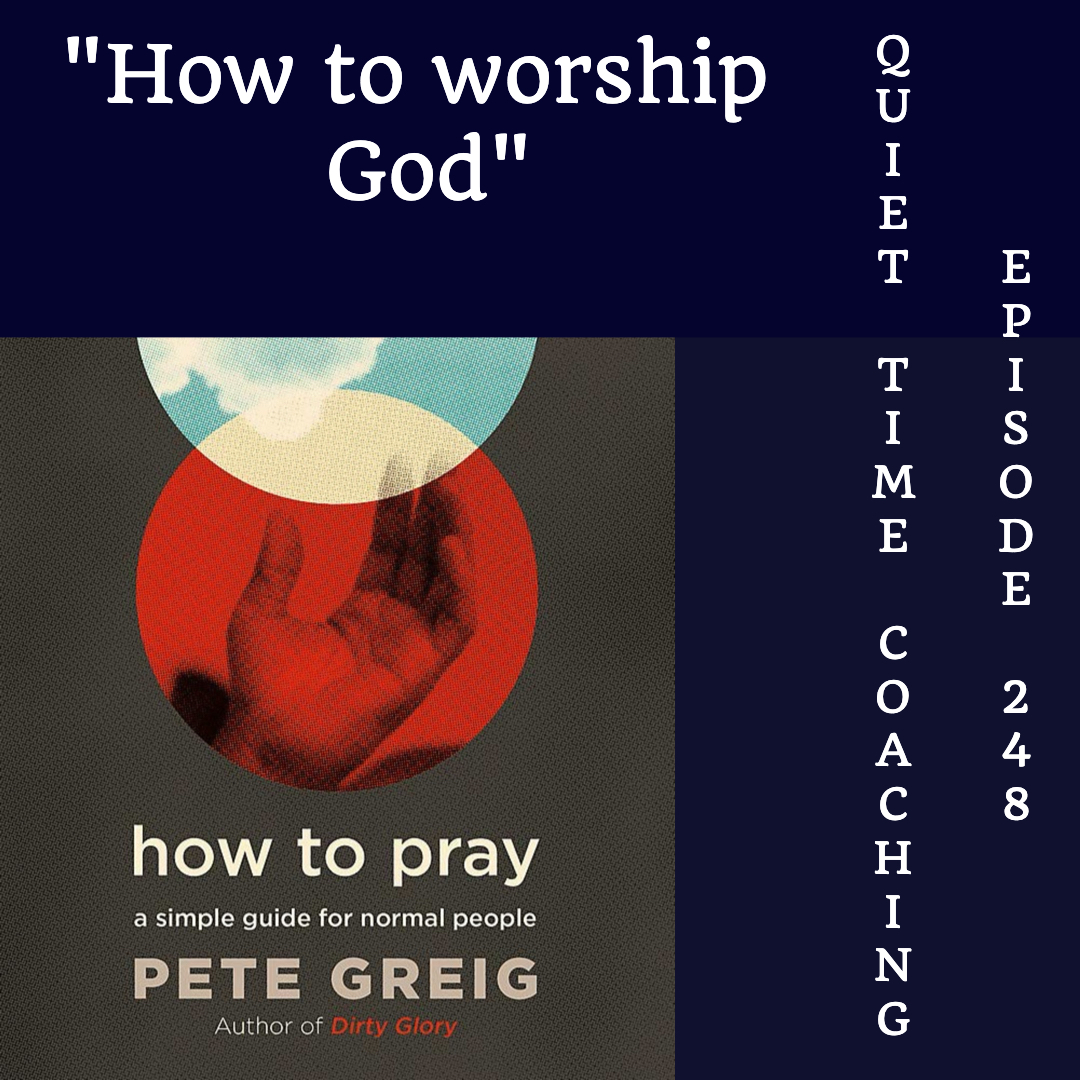Quiet Time Coaching Episode 248

- I am in my third year of participating in the Renovare book club. The first book in this season’s set of four is “How to pray” by Pete Greig.
- Quiet time coaching episodes will focus on his book for the next few weeks. You don’t need to read it to benefit from these recordings, but you might like to get hold of a copy for yourself. I have finished the book and can thoroughly recommend it. A full review of the book will come at a later date in “What we are reading”.

- Today we will reflect on the fourth chapter of the book, “Adoration: how to worship God”. Theme scripture: “Our Father in heaven, hallowed be your name;” (Matthew 6:9 NIV11)
- Perhaps adoration is the aspect of prayer a Christian feels should come most naturally. But it ain’t necessarily so. Therefore, before we get into today’s topic, a word to all those guilty souls who find it harder than they would like to express adoration in prayer.
- The first and most important thing to say about any of our struggles in prayer is that God is more interested in the intentions of our heart than the quality of execution. Quoting Augustine, Pete Grieg reminds us that:
“‘God’s ear hears the heart’s voice’”
Greig, Pete. How to Pray: A Simple Guide for Normal People (p. 57). John Murray Press. Kindle Edition.
- You are not alone in your situation. We have a helper in the midst of our all-too-often admittedly weak attempts to express our adoration to God: “In the same way, the Spirit helps us in our weakness. We do not know what we ought to pray for, but the Spirit himself intercedes for us through wordless groans.” (Romans 8:26 NIV11)
“…you may doubt the strength of your own resolve and the sincerity of your faith, but at least try to trust that the Spirit’s translation of your prayers stands a pretty good chance of getting through to the Father’s heart on your behalf!”
Greig, Pete. How to Pray: A Simple Guide for Normal People (p. 57). John Murray Press. Kindle Edition.
- Our inadequacy is no surprise to God. He is not taken off guard, nor appalled. He is, surely, simply glad we would make the attempt. Anything offered in faith is acceptable:
“I’d rather have a little faith in a great, big unshakable God than a great, big unshakable faith in a little god unworthy of the title.”
Greig, Pete. How to Pray: A Simple Guide for Normal People (p. 60). John Murray Press. Kindle Edition.
- With these thoughts in mind, let’s turn to six suggestions from the book to help us adore our God.
1. Awakening my soul
- Healthy adoration is not dependent on feelings. Sometimes we have to take charge of our spirit and tell it to worship! Making ourselves worship is not insincere:
“The writer of Hebrews urges us to ‘offer to God a sacrifice of praise’. What could be more sacrificial than praising him when we don’t feel like it?”
Greig, Pete. How to Pray: A Simple Guide for Normal People (p. 61). John Murray Press. Kindle Edition.
- The next time you don’t feeling like adoring God, start by making a start.
2. Praying a Psalm
- If they were good enough for Jesus, they should be good enough for you and me. The Psalms were the prayer-manual for all Jews of Jesus’ time. One of the beautiful aspects of the Psalms is the way they reorient our thinking:
“I often find that my feelings and priorities are realigned as the Psalms draw me into a worldview older and stranger than my own. ‘
Greig, Pete. How to Pray: A Simple Guide for Normal People (p. 62). John Murray Press. Kindle Edition.
- Read a Psalm out loud, slowly, in your next prayer time and allow it’s truth remold your mind and spirit.
3. Worshipping with Bach, Beyonce and Bethel
- Music is a gift, and no one genre is more spiritual than another. Are you using music to enhance your times of prayer?
“Melody and harmony are God-given gifts that can stir the human soul more powerfully than any other external stimulus.”
Greig, Pete. How to Pray: A Simple Guide for Normal People (p. 62). John Murray Press. Kindle Edition.
- Plan to include music in an upcoming time of prayer. Whether it contains uplifting words, or instrumentals that help you focus on the Lord, give it a try.
4. Worshipping with others
- We are designed to prayer with other believers. Prayer is personal, but it is also communal:
“‘Our’ Father in heaven. Not my father. Not your father. Ours. This is a family thing.”
Greig, Pete. How to Pray: A Simple Guide for Normal People (p. 63). John Murray Press. Kindle Edition.
- Could you make a plan to prayer with another Christian this week?
5. Liturgy: The shape and the shaping of our prayers
- Liturgy (a predetermined set form of worship) is not anti-Biblical or unspiritual in essence. There are times we can use the inspiration of others and the tried-and-tested learning of our spiritual ancestors to help us adore God:
“When your soul is spent and you’ve run out of imagination and initiative it’s a relief to be told what to say by someone you trust.”
Greig, Pete. How to Pray: A Simple Guide for Normal People (p. 63). John Murray Press. Kindle Edition.
- In a soon-to-come prayer time plan to use a prayer or form of worship written by someone else. At the moment I am using the Lectio 365 app.
6. Worshipping with your own weirdness
- No two people find their worship-inspiration in exactly the same way. There may be common threads – often nature, music and art – but those are big categories. What sets your worship fuse off?
“Try to identify and pursue the particular people and places, the music and activities. that speak the mother-tongue of your heart.”
Greig, Pete. How to Pray: A Simple Guide for Normal People (p. 65). John Murray Press. Kindle Edition.
- Find your spark (or sparks) and be deliberate about accessing them regularly.
- [The book I mention in the podcast: “The Return of the Prodigal“, Henri Nouwen]
Conclusion
- I read this quote recently from Willard’s book, “Life without lack“:
“First of all, my child, think magnificently of God. Magnify His providence; adore His power, pray to Him frequently and incessantly. Bear Him always in your mind. Teach your thoughts to reverence Him in every place for there is no place where He is not. Therefore, my child, fear and worship and love God; first and last, think magnificently of Him!”
—PATERNUS, ADVICE TO A SON
- A vital part of our times of quiet with God are those moments we attempt to “think magnificently” of God.
- Questions for discussion:
- What stands out to you about adoration?
- How might your prayer life grow if you could learn how to pray adoringly?
- Suggestion: Make adoration a part of your daily prayers
- Resources mentioned in the book:
- PRAYER TOOLS: 1. How to Pray the Psalms. 2. How to Practice Christian Meditation. 3. How to Pray Creatively. 4. How to Practice the Presence of God (http://prayercourse.org).
- FUTHER READING: The Practice of the Presence of God, by Brother Lawrence.
- Please add your comments on this week’s topic. We learn best when we learn in community.
- Do you have a question about teaching the Bible? Is it theological, technical, practical? Send me your questions or suggestions. Here’s the email: malcolm@malcolmcox.org.
- If you’d like a copy of my free eBook on spiritual disciplines, “How God grows His people”, sign up at my website: http://www.malcolmcox.org.
- Please pass the link on, subscribe, leave a review.
- “Worship the LORD with gladness; come before him with joyful songs.” (Psalms 100:2 NIV11)
- God bless, Malcolm
- PS: You might also be interested in my book: “An elephant’s swimming pool”, a devotional look at the Gospel of John



